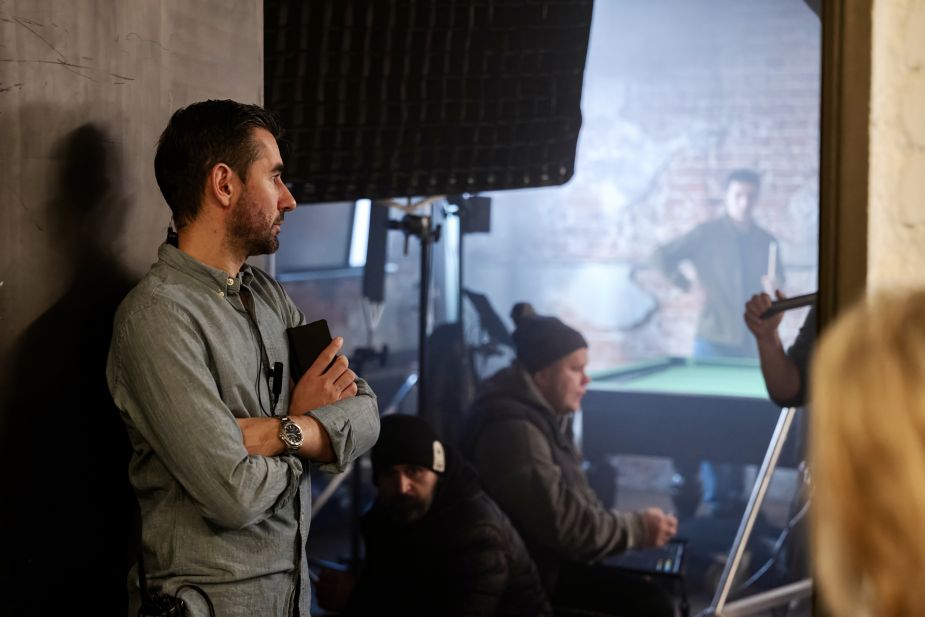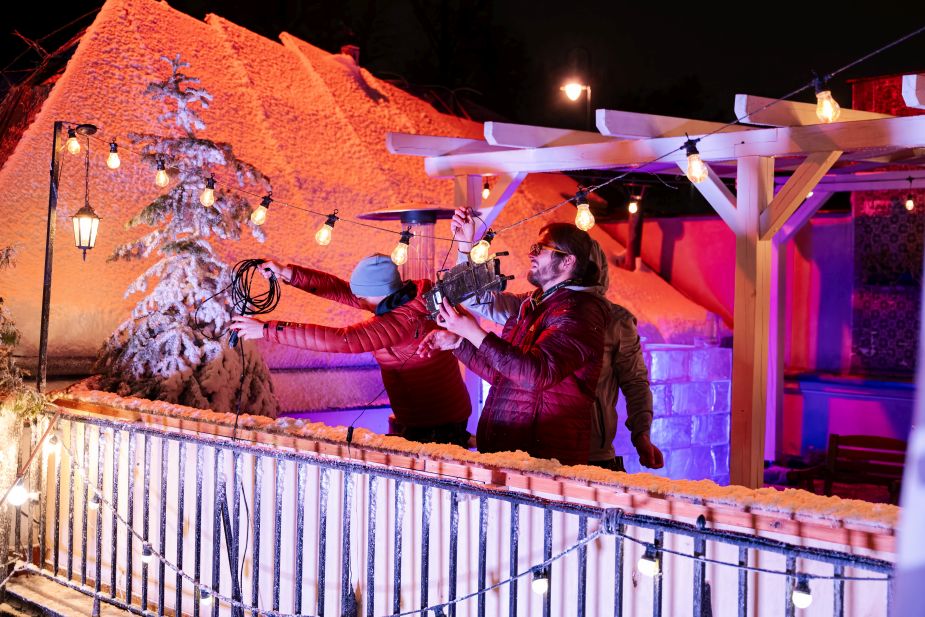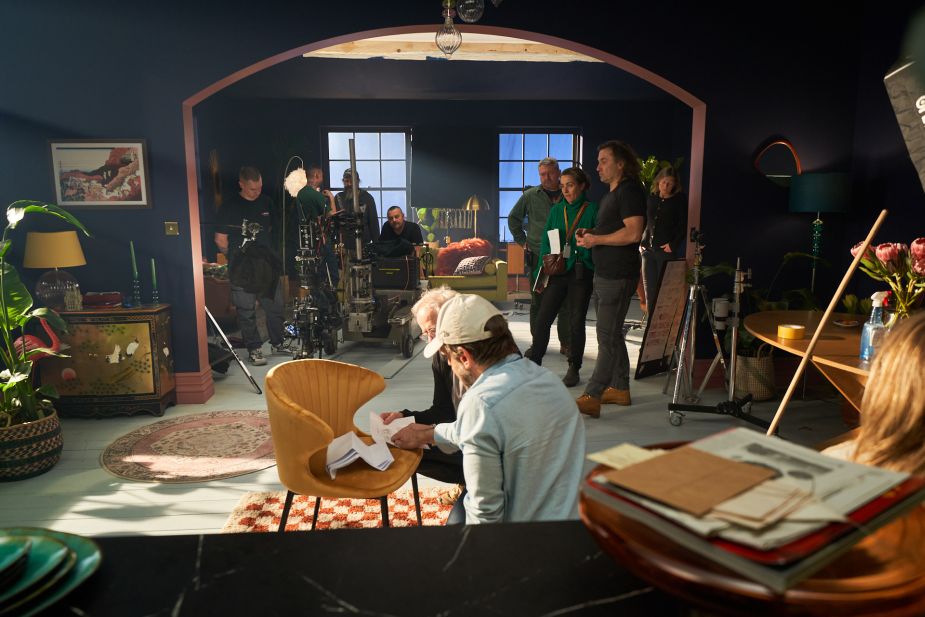
For Tango Production, Every Project Is a Partnership

Remik Bartos brings over 18 years of experience to his role as an executive producer at Tango Production Poland. A graduate of the prestigious WRiTV Film School in Katowice, he began his journey at Tango as a post-production supervisor, where he quickly showcased a strong grasp of the full production workflow.
His transition into production saw him first managing local projects before expanding into international production services. Known for his technical expertise, creative sensibility, and strategic approach, Remik has been instrumental in building Tango’s reputation as a go-to production partner for global clients across Central Europe.
Julia Bidakowska Andren is a seasoned executive producer with over 20 years at Tango Production Poland. Throughout her career, she has led a diverse portfolio of acclaimed commercial and branded content projects, earning a reputation for her precision, creativity, and unwavering reliability.
Julia’s extensive industry expertise and skill in managing complex international productions have been instrumental in shaping Tango’s growth and reputation. Her two decades of dedication have helped position the company as one of the leading production houses in the region.
LBB> Can you walk us through your journey in the production service industry?
Remik> At Tango, commercial production has always been at the heart of what we do. We've been producing ads since 1993, and over the years, it's remained our passion and primary focus.
About a decade ago, we recognised just how much Poland had to offer – diverse locations, top-tier studios, skilled crews, talented casts, and deep production know-how. It felt like a missed opportunity not to share these assets with international partners. That realisation led us to gradually evolve our business model toward production services.
In the beginning, around 30% of our projects were for foreign clients, with the majority still focused on the local market. Today, that ratio has completely flipped – about 80% of our work is now production services for international partners, while 20% is for the local market. This transition has enabled us to grow both creatively and operationally, while remaining true to the craftsmanship and values that have built our reputation.
LBB> What are some of the most challenging productions you’ve worked on, and how did you overcome those challenges?
Julia> Every production comes with its own unique set of challenges – some big, some small – and they touch every department differently. That variability is exactly what makes this profession so dynamic and rewarding.
As a producer, it’s not just about solving the immediate logistical or on-set issues. It’s also about being able to read the room, anticipate needs, and support the vision of the lead producer and often the director. That includes navigating the dynamics of the foreign and local teams that we, as producers, gather for each shoot, adjusting quickly to shifting priorities and requirements, and ensuring the production stays aligned creatively, practically, and economically.

LBB> What key qualities do you believe set your company apart from others in the industry?
Remik> What sets us apart is our commitment to a highly personal, hands-on approach. We're a small, boutique-style company, and our business model has always prioritised genuine human relationships with the producers we work with.
We don’t use bidders – instead, the producer who quotes your job is the same person who will see it through from start to finish. This ensures a deep understanding of the creative vision, potential challenges, and all the small but crucial details that can make or break a production.
Our team is exceptionally experienced. Our production managers and coordinators have been with Tango for over eight years, and some of our core production team members have been with us for more than 15 years. That kind of consistency allows us to deliver a level of trust, efficiency, and quality that’s hard to replicate.
We only take on one project at a time per producer, ensuring each client gets our full focus and attention. We pride ourselves on delivering quality over volume, and we actively avoid the impersonal, corporate-style approach. For us, every production is a partnership.

LBB> Can you share the most extreme example of a major issue that arose during a shoot and how your team resolved it?
Julia> One of the most extreme challenges we faced happened on the day of the PPM. We were informed – last minute – that the location we had secured, a government-owned property, was being withdrawn by the managing director, despite a signed rental agreement.
We immediately began negotiations with the institution, but no offer – financial or otherwise – was enough to get them back on board. It was a dead end.
Faced with this unexpected setback, we brought the director and agency team together for an emergency creative session. Instead of scrambling for a similar location, we leaned into the situation and reimagined the entire visual style of the film. The original setting was a Renaissance palace, but we pivoted to an industrial space, and with that shift, we also redefined the character of the heroine.
Looking back, the result had a unique energy and tone that may not have emerged without that obstacle. It was a great example of how fast collaboration and creative flexibility can turn a major problem into a fresh opportunity.
LBB> What strategies do you employ to maintain calm during high-pressure situations?
Remik> There’s a Polish saying: “Spokój nas tylko uratuje,” which means “Only calm will save us” – and we truly believe in that.
On set, there’s no room for hysteria. As a producer, you’re expected to be the calm, steady presence that everyone can rely on, especially in high-pressure moments. Problems will always arise, but every problem has a solution. Staying calm isn’t just a nice idea – it’s essential.
Clear, consistent communication is also key. A strong relationship between the production house and the production service partner is built on trust and shared goals. At the end of the day, you're collaborators are working toward the same outcome, and that mindset makes all the difference when the pressure is on.
LBB> How do you approach location scouting, and what factors are most important to you in this process?
Julia> When it comes to location scouting, one golden rule always applies: never overpromise a location unless you’re confident you can secure access. It’s tempting to show the most visually stunning spots, but it's far more important to present realistic options that align with the brief and have at least a reasonable chance of permit approval.
We always begin by exploring our own extensive location database, which helps streamline the process and reduce costs. From there, we involve our in-house location scout, who is a valuable asset to our team. Having a dedicated location manager on staff allows us to stay flexible in terms of cost and scheduling and ensures a faster, more reliable scouting process.
Ultimately, it’s about striking a balance between creativity and feasibility – finding the right look while keeping production practical and efficient.
LBB> Are there any principles you always go back to manage budget constraints without compromising on production quality?
Remik> One key principle we always return to is the strength of long-standing, trusted relationships. At Tango, being an established production service partner with deep, stable connections to our core crew and department heads allows us to negotiate fair fees – without sacrificing production quality, even on tighter budgets.

Maintaining honest, respectful relationships with the people we hire is essential. Their performance is a significant factor in why clients return to us. When you’ve built mutual trust over time, it becomes much easier to find creative solutions that maintain high quality, regardless of budget limitations.
LBB> What’s most important to ensure you’re working well with local crews and talent?
Julia> The most important thing is mutual respect and clear communication from day one. Local crews and talent are the backbone of any successful production, and treating them as true collaborators, not just hired help, makes all the difference.
We make it a point to brief everyone properly, set clear expectations, and ensure they're involved in the process, not just executing tasks. That means listening to their input, respecting their time, and making sure they feel valued on set.
For example, on a recent international shoot, we had a tight schedule and limited daylight.
Our local gaffer suggested a smart pre-lighting setup that saved hours each day. Because we’ve built a culture where people feel safe speaking up and contributing, we were able to stay on schedule without cutting corners. That kind of collaboration is only possible when everyone feels like a respected part of the team.
LBB> How do you foster strong relationships with clients to encourage repeat partnerships?
Remik> It really comes down to two core values: communication and honesty. The strongest, longest-lasting relationships are built on trust, and that only happens when you're transparent, reliable, and genuinely invested in your clients' success.
It’s also important to stay on their radar, especially in a fast-moving industry. Regularly reaching out with meaningful updates – whether it’s a standout project, a shift in market conditions, or even something interesting happening in Poland – helps keep the connection alive.
I clearly remember one of my longest-standing clients saying during a face-to-face meeting in London: “Keep reminding me of Tango and Poland on a regular basis.” That stuck with me. Consistent, thoughtful communication makes clients feel connected – and reminds them why they chose to work with you in the first place.
LBB> There are, of course, fundamentals that remain, but all industries are changing rapidly these days. How do you see the production service industry evolving in the next five years?
Julia> We believe one of the key shifts in the next five years will be the integration of AI into the production process – and understanding how we can use it to our advantage. From pre-production planning and location matching to scheduling, budgeting, and even post-production workflows, AI has the potential to streamline operations and enhance creativity.
It’s not about replacing people, but about using technology to work smarter. As production service providers, staying ahead of these tools – and knowing how to implement them effectively – will be essential to remaining competitive and delivering even greater value to our clients.
LBB> If you could give one piece of advice to clients looking for production services, what would it be?
Remik> If we could give one piece of advice to clients looking for production services, it would be this: always ask for references and speak directly with fellow producers who have worked with the company, or at least in the country you’re considering.
Word of mouth remains one of the most reliable indicators of quality and professionalism in our industry. A slick website or polished pitch can only tell you so much. Hearing about real-world experiences – how a company handles pressure, solves problems, communicates, and treats both clients and crew – can give you invaluable insight.
Trust is everything in production. A strong reputation, backed by personal recommendations, is often a better guarantee of a smooth and successful shoot than any presentation or budget sheet.















